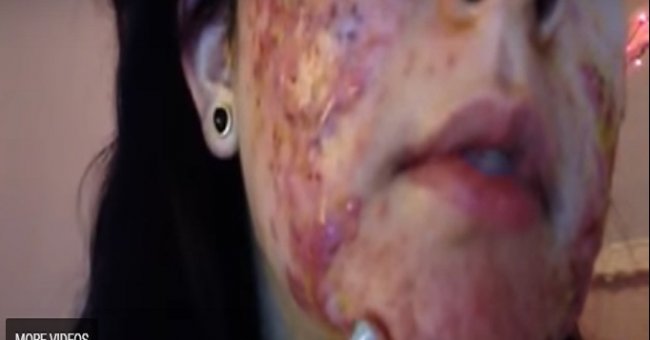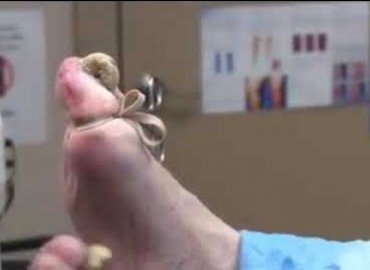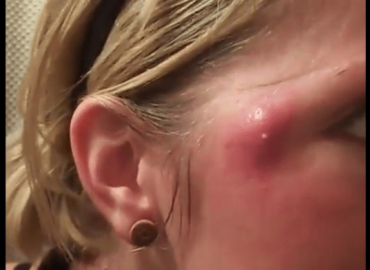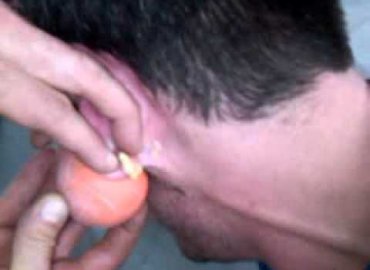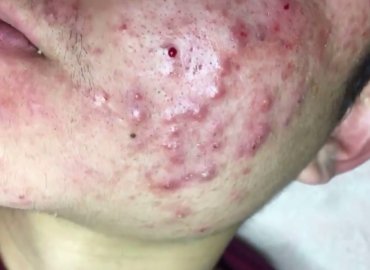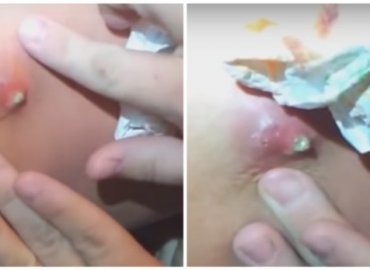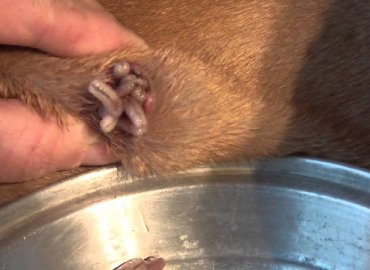American man ‘Raymond’ has had a cyst on his neck for 10 years
Doctor cuts into his skin to drain it and yellow pus oozes out
After squeezing the skin it erupts, splattering foul-smelling pus everywhere
Raymond had an epidermoid cyst which had become infected
This is the utterly revolting moment a man’s cyst erupts with pus as it is surgically drained.
Not for the remotely squeamish, the video shows a torrent of yellow and clear liquid being sprayed from underneath the man’s skin.
The patient, who is nicknamed Raymond, says he has had the cyst, which is on the right hand side of his neck, for more than 10 years.
It regularly becomes inflamed, and he takes antibiotics, and usually it dies down.
However, this time it became infected and now needs to be drained surgically.
In the film, Dr John Gilmore, an ENT and facial plastic surgery surgeon in Dallas, Texas, is seen cutting into the man’s neck after numbing it with anaesthetic.
He cuts deeper into the skin in order to locate the whole cyst.
‘This is going to be the size of a peach pit by the time we’re done,’ he says of the cut.
Then, as he squeezes the skin, yellow-green pus oozes out. at first, so slowly he is able to mop it up with tissue.
But as he squeezes harder, a gush of the foul-smelling liquid sprays everywhere.
After a third squeeze, the disgusting fluid splatters over the bedsheets, taking even the doctor by surprise.
‘We’ve got pus everywhere over here,’ he says.
‘Good grief that is awful,’ he adds, commenting on the smell.
‘I’ve been carrying that around for a couple of weeks now,’ Raymond says.
Determining Whether a Pimple Can Be Popped
Pop whitehead pimples. Whitehead pimples have usually been around for a few days, and they have a white tip where pus has collected underneath the skin. These pimples are easy to pop, and when treated with care they can be safely removed without spreading the infection or causing scarring.
Don’t pop new pimples. Pimples that have just appeared in the past day or two aren’t ready to pop yet. Wait until the whitehead appears at the tip of the blemish.
Don’t pop pimples that are big, red, or sore. This could worsen your pimple by sending bacteria deeper into your skin. Popping a pimple this big will almost definitely lead to a scar. Only a pimple with white pus is ready to pop.
Visit a dermatologist. Dermatologists can determine the best way to treat your acne. They can prescribe creams that will eliminate your pimples. There are also several procedures they can perform that can treat severe breakouts.
The most commonly prescribed dermatologist treatment is a topical cream, rubbed on the pimples, that will remove oil from the skin and kill acne-causing bacteria.
For red, swollen pimples an oral antibiotic, hormonal birth control, or isotretinoin might be prescribed.
Large acne cysts can be removed by dermatologists through drainage and extraction, in which they remove the cyst and drain out the pus.
Your dermatologist can safely lance the pimple with a pin. This is a technique that should only be done by professionals.
Laser therapies and chemical peels can treat the underlying causes of acne, although they will not remove current cysts.
Limit pimples by washing regularly. Pimples are caused by sweat sitting on your face. Anytime you sweat, wash your face gently with lukewarm water to remove dirt and grime. Do not be harsh or scrub, just wash off sweat.
When you’re a teenager, it’s not unusual to have a pimple or two. But if you have large, red, and painful breakouts deep in your skin, it could mean you’ve developed something called cystic acne.
These breakouts can be treated. Don’t try to wait them out. Cystic acne can linger for years. It can affect large areas of your skin and leave permanent scars. A dermatologist can help you with a treatment plan.
You get a pimple when a pore in your skin gets clogged, usually with dead skin cells. Sometimes bacteria get trapped inside the pore, too, causing the area to become red and swollen.
Cystic acne happens when this infection goes deep into your skin, creating a red, tender bump that’s full of pus. It may hurt or itch. If a cyst bursts, the infection can spread, causing more breakouts.

